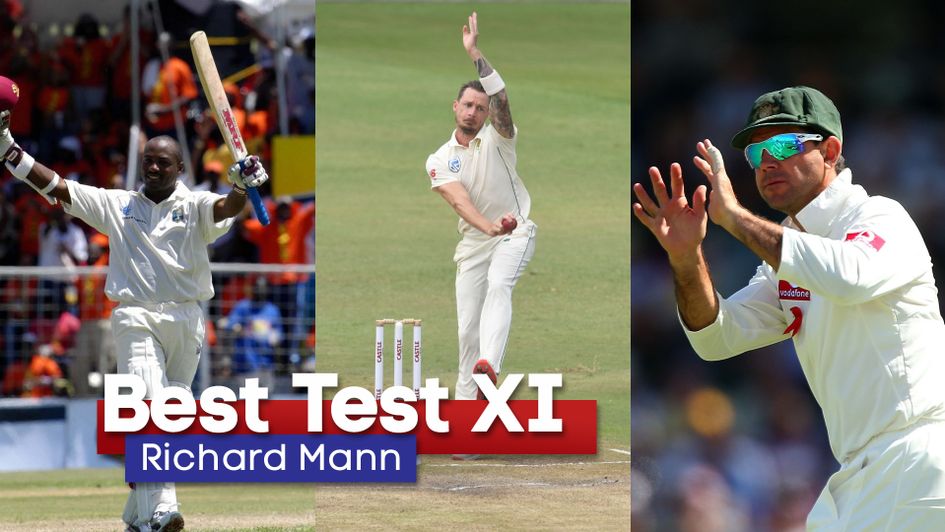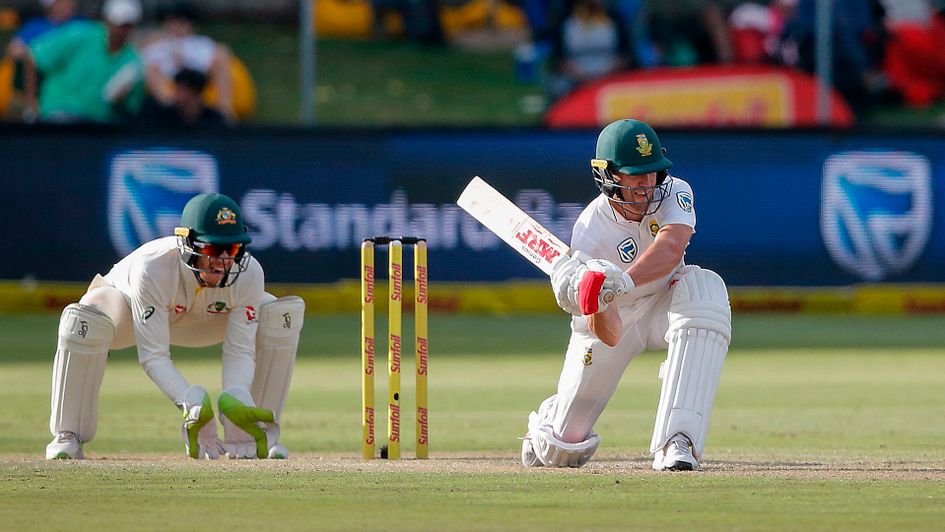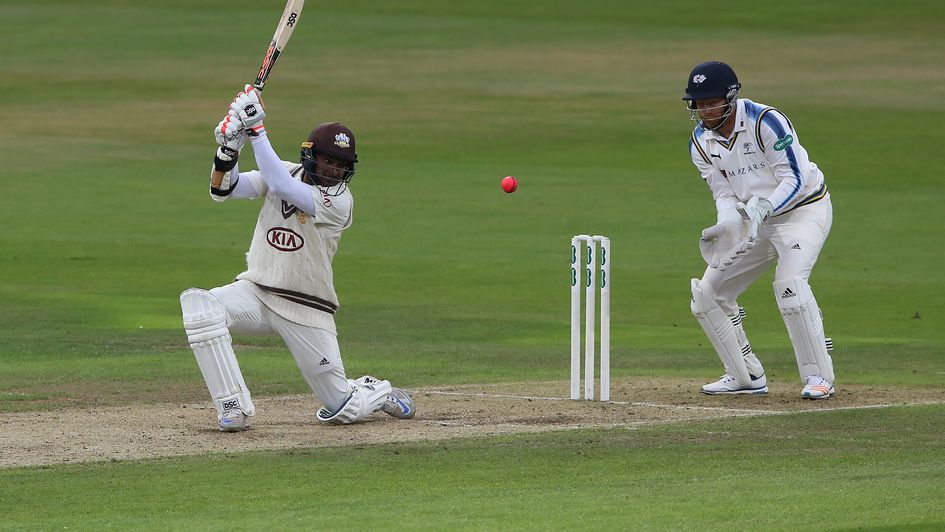
Richard Mann's cricket Test XI including Shane Warne, Ricky Ponting and Brian Lara
Cricket expert Richard Mann picks his best Test XI from the 1990's onwards with some tough selections up for debate.
Graeme Smith - 9265 runs @ 48.25
Tough, resolute and very, very good. Graeme Smith has always divided opinion, both at home in South Africa and further afield, but as an opening batsman, there have been few better in the history of the game. It was suggested that Smith's unattractive technique was one that made him a prime lbw candidate, so much so that England's players once declared that he had 'massive pads,' but the left-hander enjoyed sustained success against the Three Lions. Despite South Africa being one of the hardest places to bat at the top of the order, Smith finished his career with a fine record, one made all the more impressive by the fact he captained his country in over 100 Test matches spanning 11 years, a record that still stands today.
AB de Villiers - 8765 @ 50.66
The first of two left-field picks but one I had to make. Since first watching cricket from the mid 1990's onwards, the sport has been blessed with an abundance of terrific middle-order batsman, meaning finding a spot for AB de Villiers in this team has proved difficult. Nevertheless, given most pundits and fans would agree that the South African is the most complete batsman the game has produced, across all three forms, he can't miss out and his outstanding numbers, many of which were accumulated when having to balance wicket-keeping duties with his batting, certainly support that argument. As pure a batsman as you could wish to see, the simplicity of de Villiers' foot movement went against the grain in an era of video analysis and burgeoning coaching staffs but his extraordinary talent invariably won out and it is worth remembering that he spent the early part of his career opening. A reliable gloveman and a brilliant fielder, de Villiers really is the ultimate cricketer.

Ricky Ponting (Captain) - 13378 @ 51.85
Ricky Ponting the batsman and captain would have been one of the first picks on my team sheet but the fact he made such a success of the notoriously tricky number three spot makes his achievements even more impressive. An intimidating batsmen who played the hook and pull shots better than anyone else in the history of the game, Ponting's batting and leadership was a template for how cricket changed through the 1990's into the 2000's, top-order batsmen looking to dominate and not just survive as run rates in Test cricket rocketed towards four an over. Pointing's own Australia were the pioneers of this and he ended his career as the most successful captain in international history, winning 220 matches of the 324 he led Australia in. While often criticised for being a formulaic tactician when having Shane Warne and Glenn McGrath in his ranks, Ponting's decision to play on while many of his peers walked away from Australian cricket saw his captaincy evolve and gain more admirers while the help and guidance he afforded Michael Clarke in the infancy of his own lauded captaincy reign must not be forgotten.
Brian Lara - 11953 @ 52.88
Quite simply, the best batsman I have ever seen. Brian Lara mixed Caribbean flair with an insatiable appetite for runs and he left the game proudly holding the highest score in Test match history - 400 not out against England in Antigua - and the highest first-class score - 501 not out for Warwickshire against Durham. A glorious sight when in full flow, Lara dazzled fans with his high backlift and extravagant trigger movement in a career that spanned three decades. Still, Lara endured his fair share of low points - three spells as captain of the West Indies seeing him come under heavy criticism at various points - though his genius ensured he rarely stayed quiet for long. Aside from the world records, Lara's crowning moment arguably came in 1998-99 when he took apart a star-studded Australian attack with an incredible display of batting, scores of 213, 8, 153 not out and 100 single-handedly allowing the hosts to draw a series they had appeared destined to lose. He wasn't always perfect but as Ricky Ponting once admitted, 'Lara was the one batsman who could give you sleepless nights as a captain.'
If I'm batting three on Sunday, hopefully this guy is on my team and batting four @brianlara pic.twitter.com/dsaXhJTLoU
— Ricky Ponting AO (@RickyPonting) February 6, 2020
Younis Khan - 10099 @ 52.05
A selection sure to surprise almost everyone who reads this piece and one I have wrestled with. Sachin Tendulkar was the obvious choice to slot in at number five, or indeed at four with Lara easing down a spot. The 'big three' of Ponting, Lara and Tendulkar would offer a mouthwatering prospect in the middle order but Pakistan's Younis Khan was a fabulous performer, and a criminally underrated one at that, and he just earns the nod. While off-the-field issues consistently dogged Pakistan cricket, Younis Khan remained one of the few constants on the field, his penchant for making big hundreds once set helping Pakistan rise to the top of the world rankings in 2016. That Younis finished his career with an average well in excess of 50 demonstrates his greatness and the fact those numbers barely dip away from home is testament to his well-rounded game and his ability to score runs in all conditions.
Jacques Kallis - 13289 @ 55.37 and 292 wickets @ 32.65
The easiest selection of all. With an average superior to that of many of his peers, Jacques Kallis would warrant a place in almost any starting XI for his batting alone and the fact he was also a very fine outswing bowler means he will be remembered as a once in a lifetime cricketer. Kallis was the rock from which South Africa's batting was built around for almost 20 years while his 292 Test wickets offered his side priceless balance, something many other countries admired and constantly tried to copy from afar. His bowling was no back number, either: strong with big shoulders, Kallis was genuinely quick in his early days before spending the latter part of his career parked at slip in-between delivering 'dry' spells with the old ball when his team needed him to do so. His batting was a coach's dream: a classical, near faultless technique harnessed by the patience of a saint. The best all-rounder of our time, maybe the best cricketer of all time.
Kumar Sangakkara - 12400 @ 57.40 and 202 dismissals
Another pick that will draw contention but this one is much more clear cut to my mind, Kumar Sangakkara deservedly taking the gloves ahead of Adam Gilchrist. The Australian is seen by many as having transformed the role of wicketkeeper and changing the perception of what that role should demand, but while his batting was spectacular and, at times, unstoppable, Sangakkara was the better player. Like Kallis before him at number six, Sangakkara could bat anywhere in this top seven and not look out of place and a Test average closer to 60 than any of his contemporaries bares illustration to that. That Sangakkara's average nosedived to 40.48 in Test matches played as wicketkeeper, as oppose to 66.78 when not keeping, further strengthens that point though his reliable glovework, particularly on turning pitches in Asia, puts him further ahead of Gilchrist.

Shane Warne - 708 wickets @ 25.41
The only quandary here was whether Shane Warne would be the lone spinner or would be joined by Muttiah Muralitharan. Warne transformed spin bowling, particularly leg spin, and had he not opted to bring the curtain down on his career when still seemingly at the peak of his powers, 1000 Test wickets might not have been out of the question. His subsequent exploits in the IPL and Big Bash confirmed he remained a very fine bowler and it took Nathan Lyon's emergence to finally fill the huge shoes he left. Warne burst on to the big stage proper when bowling Mike Gatting with 'that ball' in the 1993 Ashes, a drifting, dipping leg break that pitched outside leg stump and spun past Gatting's outside edge before clipping the off stump. The rest, as they say, is history, and the great bowler and great showman would spend much of the next 14 years terrorising batsman across the globe, particularly in Ashes cricket with which Warne became synonymous. In 2005, the mighty Australia were finally slayed by England in the most memorable series of all but while his colleagues faltered, Warne stood tall, ending the summer with 40 wickets and as Player of the Series. It was only fitting then, that when Australia had reclaimed the Ashes less than two years later, Warne felt he had given enough.
Dale Steyn - 439 @ 22.95
Bowling fast is tough work and to do it for close to 100 Test matches is a fine effort. Dale Steyn managed 93 Tests and while injuries plagued him for the latter part of his international career, he remained mean and snarling, clever and skilful but above all else, very, very fast. Even now, with his international career long gone and a diet of Franchise cricket all his battered right shoulder can manage, Steyn is still hitting speeds in excess of 90mph. Right from the beginning, from his Test debut against England at Port Elizabeth in 2004, it was plain to see that Steyn had something special: genuine pace, a wicked outswinger that would curl late, and later in his career, an inswinger that, while not quite as good as James Anderson's, was pretty close. In fact, Steyn and Anderson spent much of their careers as the chief rival to one and another but while Anderson has proven the stronger stayer, and with a few more tricks in his magic box, too, Steyn has been the more destructive with his superior pace giving him an extra tool on slower, lower surfaces in the subcontinent.
Fast bowling does not get much better than this from the great Dale Steyn, who turns 36 today pic.twitter.com/g2ySb1HaN1
— cricket.com.au (@cricketcomau) June 27, 2019
Curtly Ambrose - 405 @ 20.99
It wouldn't be a Test team without a West Indian fast bowler and Curtly Ambrose is the best I've seen from those shores in my lifetime. His extraordinary numbers - 405 Test wickets at an average of 20.99 - make for impressive reading but Ambrose was about so much more than statistics. Ambrose, all six foot eight inches of him, was a fearsome sight when in full song. That long, languid approach to the crease, that coil: long arms and long legs smoothly finding their place like the different pistons of a naval vessel before the final flick of the wrist sent the ball whistling towards its target with unwavering accuracy. It was that accuracy that made Ambrose such a fine operator for so long, and in so many different conditions, and even when his pace dimmed slightly in the twilight of his career, he remained an irresistible force right up until the end.
Glenn McGrath - 563 @ 21.64
The presence of Ambrose - another tall bowler who bowled almost exclusively back of a length - in the line-up raised the prospect of overlooking Glenn McGrath in the search for variety but in the end, the Australia's superior record won out. Much like Ambrose, McGrath built a career on relentless accuracy and keeping things wonderfully simple. Quicker than many gave him credit for, particularly in his early days, McGrath was a fierce competitor on the field who produced for his country time and time again. Had he not rolled his ankle when stepping on a stray ball minutes before the second Test of the 2005 Ashes, that series would have surely had a different result and like all great champions, he ensured he still had enough left in the tank when it was needed most, Australia's regaining of the Ashes in 2007 allowing him to walk off into the sunset at the end of a glittering career.
Honourable mentions...
James Anderson can rightly feel hard done by to have missed out despite having passed 150 Test matches - the most by any bowler in the history of the game - and moved on to 584 wickets in the process. He will eventually retire as the leading fast bowler in Test history, in terms of wickets taken, and could easily have made his way into my team.
So, too, Brett Lee whose express pace and wholehearted attitude set him apart from many of his peers. Wasim Akram was another fast bowler to come under consideration while Muttiah Muralitharan would have got the nod had I opted for a second spinner to play alongside Shane Warne.
In the batting department, the obvious omission is Sachin Tendulkar, who very nearly forced a late rewrite, while Alastair Cook would have been the choice had AB de Villiers not been asked to move up to open the batting.
Finally, Ricky Ponting got the nod to captain the side but had I felt the need for a more creative tactician, Sri Lanka's Mahela Jayawardene would have been my choice to lead the side. A terrific batsman who was easy on the eye, Jayawardene made a habit of delivering when his country needed it most and his captaincy on the field was just about as good as I've seen.
MOST READ
Next Off
Fixtures & Results



















